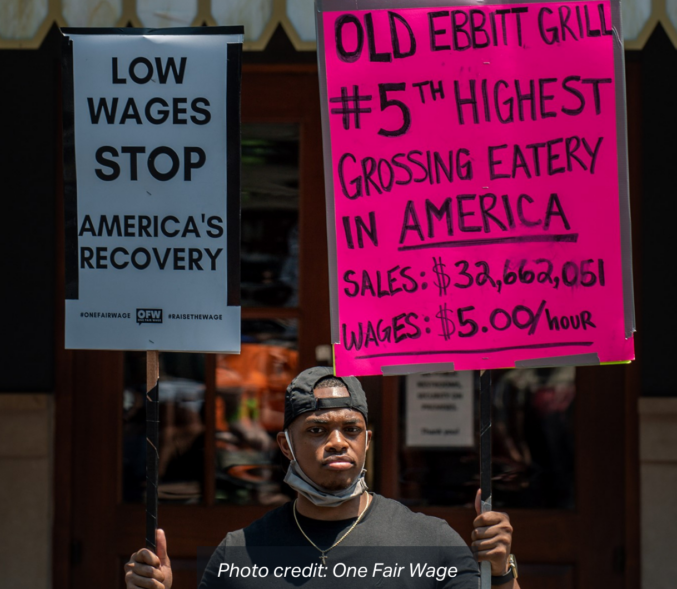Raise the Minimum Wage and Expand Coverage
All people in the United States deserve and need a minimum wage that they can live on.

Raise the Federal Minimum Wage
The federal minimum wage is a meager $7.25 an hour; Congress hasn’t increased it since July 24, 2009.
Jobs that pay a living wage are the foundation of a good-jobs economy. We are fighting to raise the minimum wage so it becomes a living wage—so that all workers can afford to put food on the table, pay the bills, and save for the future.
We partner with workers and advocates to call on Congress to:
- Raise the federal minimum wage.
- Expand minimum wage coverage.
- Adopt automatic cost-of-living adjustments (“indexing”) so workers’ wages don’t get left behind.
It’s time for Congress to pass the Raise the Wage Act, which would gradually increase the federal minimum wage to $17 per hour by 2028.
Raising the Minimum Wage Would Particularly Benefit Women and Workers of Color
per year is the additional income on average a $17 minimum wage would deliver to Black workers who work year-round.
of Latinx workers would get a raise if the federal minimum wage were increased to $17.
women would see a pay increase if the Raise the Wage Act were passed.

Workers across the country are building their power. They have demanded and won higher state minimum wages and higher wages from corporations and employers across the country. Unfortunately, Congressional inaction on this important issue is keeping wages too low for too many, particularly Black workers in the South.
Rebecca Dixon, NELP President and Chief Executive Officer
Raise State and Local Minimum Wage Floors
Underpaid workers literally cannot afford to wait any longer for Congress to raise the federal minimum wage. They are taking matters into their own hands by driving campaigns to raise their state and local minimum wages. More than 30 states and 100 localities have raised their minimum wages above the federal floor.
NELP is fighting alongside worker leaders and advocates for minimum wage increases at the federal, state, and local levels. And we’re advocating to promote the power of local communities to set their own higher wages and better protect workers without state lawmakers getting in the way.
We are supporting worker-led state and local minimum wage campaigns around the country, many of which are calling for a wage floor of $20 or more.
Where Are State and Local Minimum Wage Campaigns Happening?
Ballot and legislative campaigns that may deliver more minimum wage increases in 2024 include:
- Alaska: Ballot campaign for $15 by 2027 minimum wage, plus earned sick leave.
- California: Ballot campaign for $18 by 2025-2026.
- Massachusetts: Legislative campaign for $20 by 2027.
- Missouri: Ballot initiative for $15 by 2026, plus earned sick leave.
- New York: Possible legislative campaign to strengthen the minimum wage deal struck in 2023.
- Ohio: Ballot campaign for $15 by 2028. Separate legislative campaign for $15 by 2027 (OH State Senate) and $15 by 2028 (OH State House).
- Oklahoma: Ballot initiative for $15 by 2027, plus paid sick leave.
- Boulder County, CO: Legislative campaign for $25 by 2028.
Workers Demand a Raise!
“Every working person deserves a living wage that can support a family. With the federal minimum wage still at $7.25 per hour, we’re nowhere near that reality. Our work isn’t done!”
– Frances Holmes, food worker, St. Louis, MO
Eliminate Unjust Minimum Wage Exclusions
The Fair Labor Standards Act (FLSA) established essential worker protections, including a federal minimum wage, overtime pay, and the banning of child labor. But the FLSA’s reach and impact have fallen short because the law leaves out many workers who need those protections.
The FLSA is an example of how systemic racism, misogyny, and ableism are baked into the law. Although the FLSA became law more than 85 years ago, many workers—such as tipped workers, agricultural workers, youth workers, and disabled workers—are still shut out from the FLSA’s full protection.
It’s time for Congress to get rid of these discriminatory exclusions and fulfill the promise of the FLSA.
We call on Congress to:
- Raise the minimum wage to a living wage.
- Phase out the subminimum wage for tipped workers.
- Eliminate the lower wages allowed for youth and workers with disabilities.
- Extend overtime protections to agricultural workers.
- Ensure that incarcerated and detained workers are fully protected by wage and hour laws.
These policy solutions will provide more equitable and just treatment to the millions of workers who have been excluded from the protections of the FLSA for far too long.
Reform Overdue: Workers Still Excluded from Full Federal Wage Protections

Raising the minimum wage is one of the most popular labor policies. Support for higher wages cuts across political and demographic spectrums. It’s a critical tool to improve working families’ economic security and narrow the pernicious racial and wage gaps.
Yannet Lathrop, Senior Researcher and Policy Analyst
Related Resources
Report: Raises from Coast to Coast in 2024

Fact Sheet and FAQ: Why the U.S. Needs at Least a $17 Minimum Wage

Report: Ten-Year Legacy of the Fight for $15 and a Union Movement: Reducing the Racial Wealth Gap and Generating Tens of Billions in Additional Economic Activity

Testimony: Narrowing the Gender Wage Gap by Raising the Minimum Wage to $21.25 and Eliminating the Subminimum Wage for Tipped Workers

Testimony: In Support of HB 4237, Which Would Repeal Preemption and Allow Local Governments to Raise Wages and Adopt Other Labor Protections

Testimony: In Support of SB 171, Which Would Repeal Preemption and Allow Local Governments to Raise Wages and Adopt Other Labor Protections

